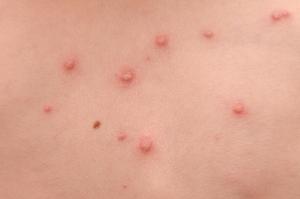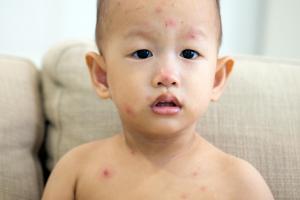Chickenpox
Chickenpox is a mild and common childhood illness that most children catch at some point. Chickenpox is caused by a virus. It's spread quickly and easily from someone who is infected.
Symptoms of chickenpox
The most commonly recognised chickenpox symptom is a spotty, blistering red rash that can cover the entire body.
Chickenpox spots

The spots normally appear in clusters and tend to be:
- behind the ears
- on the face
- over the scalp
- on the chest and belly
- on the arms and legs
However, the spots can be anywhere on the body including:
- inside the ears and mouth
- on the palms of the hands
- soles of the feet
- inside the nappy area

Although the rash starts as small, itchy red spots, these develop a blister on top and become intensely itchy after about 12 to 14 hours.
After a day or two, the fluid in the blisters gets cloudy and they begin to dry out and crust over. After one to two weeks, the crusting skin will fall off naturally.
Feeling unwell
However, even before the rash appears, you or your child may have some mild flu-like symptoms, including:
- feeling sick
- a high temperature (fever) of 38°C (100.4°F) or over
- aching, painful muscles
- headache
- generally feeling unwell
- loss of appetite
These flu-like symptoms, especially the fever, tend to be more common and worse in adults than in children.
Unusual symptoms
Most healthy children (and adults) recover from chickenpox with no lasting ill-effects simply by resting, just as with a cold or the flu.
However, some children and adults are unlucky and have a more severe bout.
Contact your GP straight away if you or your child develop any abnormal symptoms, such as:
- the skin surrounding the blisters becoming red and painful
- pain in the chest or difficulty breathing
- signs of dehydration, such as fewer wet nappies, drowsiness and cold hands and feet
In cases such as this, prescription medicine or hospital treatment may be needed.
When to contact your GP
Contact your GP if you're not sure whether you or your child have chickenpox.
Contact your GP urgently if you have been in contact with someone who has chickenpox, or you have chickenpox symptoms and:
- you are pregnant
- you have a weakened immune system (the body’s defence system)
- your baby is less than four weeks old
Chickenpox in these cases can cause serious complications, if left untreated. It is essential to seek medical advice so that you can receive any necessary treatment.
Contact your GP if you have chickenpox and are breastfeeding. They can advise about whether you should continue breastfeeding your baby.
Preventing the spread of chickenpox
Chickenpox is caused by the varicella-zoster virus. You catch it by coming into contact with someone who is infected.
The Public Health Agency recommends if your child has chickenpox you should tell their school or nursery and keep them at home while they are infectious. This is until the last blister has crusted over.
This usually takes five or six days after the rash begins.
If you have chickenpox, stay off work and at home until you're no longer infectious.
If either you or your child has chickenpox, it is also a good idea for you, or them, to avoid contact with:
- pregnant women
- newborn babies
- anyone who has a weak immune system, such as people who are having chemotherapy (a treatment for cancer) or taking steroid tablets
If someone in your household has chickenpox, you can help stop the virus spreading by wiping any objects or surfaces with a sterilising solution and making sure that any infected clothing or bedding is washed regularly.
How to treat chickenpox at home
Chickenpox can usually be treated at home.
You or your child will probably feel pretty miserable and uncomfortable, but treatment can help relieve the symptoms.
The following can help:
- use paracetamol to relieve fever and discomfort – don't use anti-inflammatory painkillers, such as ibuprofen, as they can sometimes make people with chickenpox very ill
- tap or pat the skin rather than scratching it – it's important to avoid scratching because this can lead to further problems
- drink plenty of fluids to stay hydrated
You can also buy calamine lotion, moisturising creams, cooling gels or an antihistamine medicine called chlorpheniramine to help reduce itching and soothe the skin.
Never give aspirin to a child under 16 years of age as it can be dangerous for them.
Always read the packet or leaflet that comes with the medicine to check if it's suitable and how much to take.
Speak to a pharmacist or your GP if you're unsure.
Chickenpox in adults
Chickenpox tends to be more severe in adults than children, and adults have a higher risk of developing complications.
Adults with chickenpox should stay off work until all the spots have crusted over. They should seek medical advice if they develop any abnormal symptoms, such as infected blisters.
Adults with chickenpox may benefit from taking antiviral medicine if treatment is started early.
Shingles
If you have not had chickenpox before, you can also catch chickenpox from someone with shingles (an infection caused by the same virus). However, it's not possible to catch shingles from someone who has chickenpox.
Chickenpox vaccine
There is a chickenpox vaccine, but it is not part of the routine childhood vaccination schedule. The vaccine is only offered to children and adults who are particularly vulnerable to chickenpox complications.
More useful links
The information on this page has been adapted from original content from the NHS website.
For further information see terms and conditions.